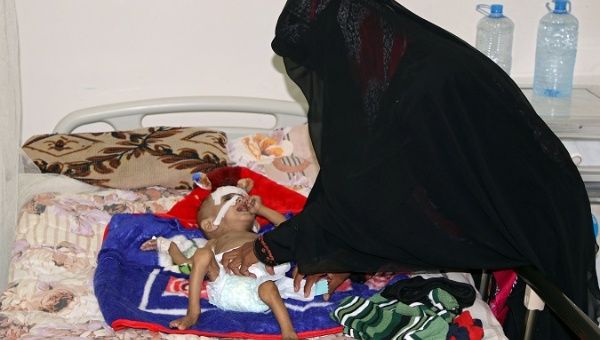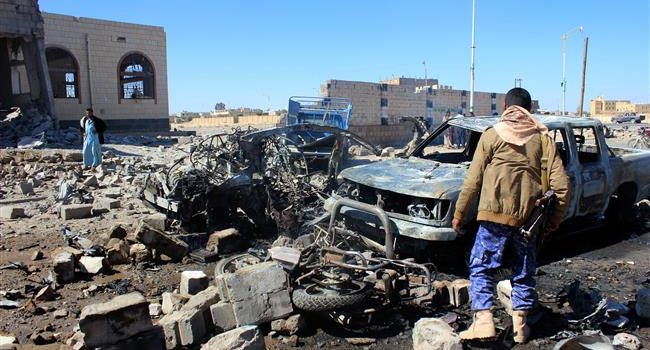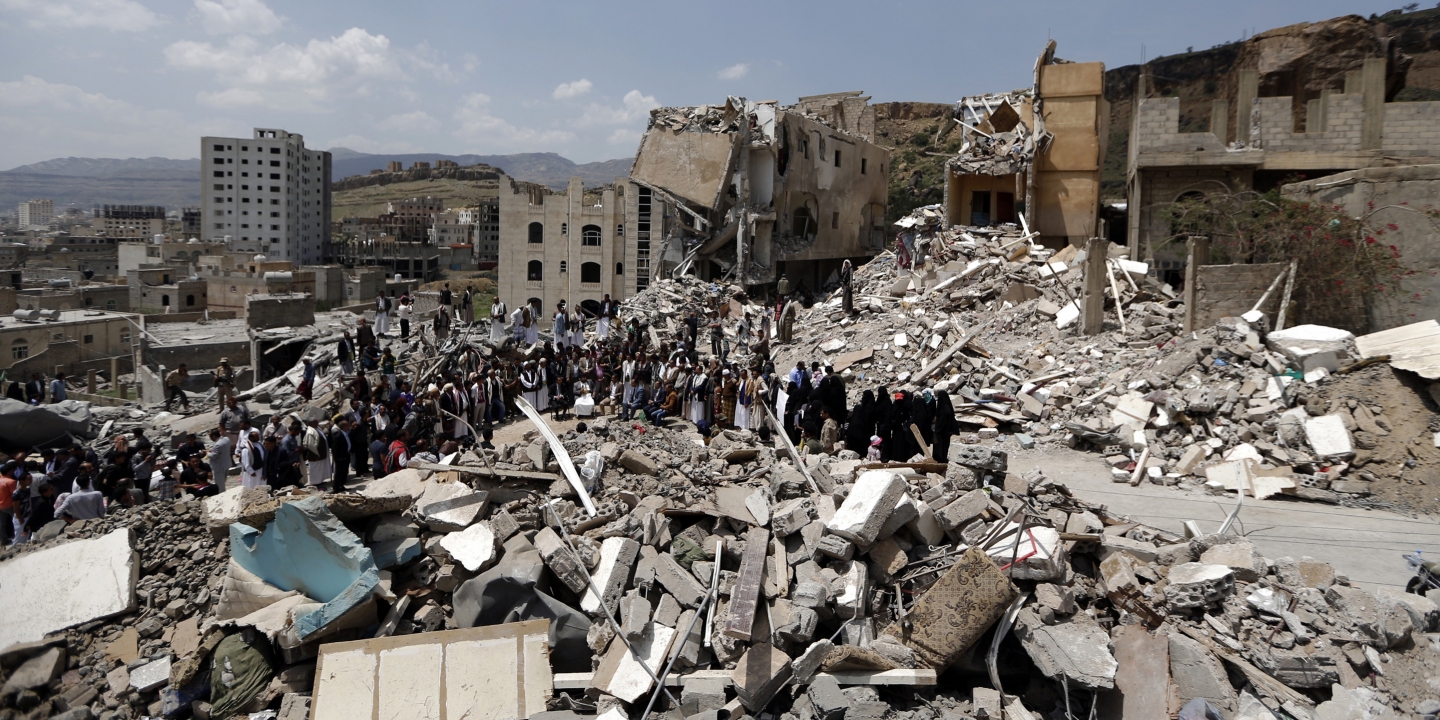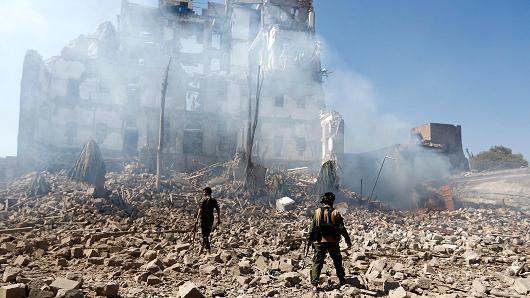www.aljazeerah.info
News, December 2017
Archives
Mission & Name
Conflict Terminology
Editorials
Gaza Holocaust
Gulf War
Isdood
Islam
News
News Photos
Opinion Editorials
US Foreign Policy (Dr. El-Najjar's Articles)
www.aljazeerah.info
|
Editorial Note: The following news reports are summaries from original sources. They may also include corrections of Arabic names and political terminology. Comments are in parentheses. |
Protracted War in Yemen Adds More Suffering by Cholera, Starvation, Saudi-Led Air Strikes, and Houthi Attacks
December 25, 2017
 |
 |
 |
 |
Death and destruction: a daily occurrence in the impoverished country of Yemen
***
Raising the spectre of wider war in Yemen
Jordan Times, Dec 23,2017
The firing of yet another ballistic missile on the Saudi capital Riyadh recently in the span of two months raises the spectre of a wider war in Yemen with grave regional implications reaching Iran.
Tehran is being accused by Saudi Arabia and its allies in the war in Yemen as being behind the recent escalation of tensions over Yemen by extending military assistance to the Houthis, its surrogate power waging the war in the country.
Two ballistic missiles have been deployed against Riyadh with the first having been fired on Saudi Arabia presumably with the knowledge and complicity of Tehran.
Both missiles were reportedly intercepted by the Saudi advanced defences, but the implications of the use of such advanced weaponry on Saudi Arabia cannot be underestimated.
US Ambassador to the UN Nikki Haley has submitted "evidence" to the UN Security Council (UNSC) in the wake of the firing of the second ballistic missile on the Saudi Arabian capital implicating Iran as the power that provided the know-how and material to the Houthis to enable them to fire this type of sophisticated missiles.
Haley told the UNSC members that "while we don't yet have sufficient insight into this particular attack, it bears all the hallmarks of previous attacks using Iranian-provided weapons".
The US ambassador called on the council to take action against Iran before it is too late by warning that "if we don't do something, we will miss the opportunity to prevent further violence from Iran".
While there is still no iron clad evidence about the direct involvement of Iran in the missile attacks on Saudi Arabia, it is hard to believe that the Houthis have advanced technology of their own to deploy ballistic missiles against their enemies.
The Houthis must have received advanced military assistance from one side or another, and by the looks of things Iran appears to be the most likely provider of the missiles that were used against Riyadh.
Meanwhile, the war in Yemen, now in its third year, has turned to the worse after the killing of the former president of the country Ali Abdullah Saleh on December 4.
His assassination by the Houthis who were his uneasy allies till he changed course and promised to "turn a new page with Saudi Arabia", in a bid for reconciliation with the kingdom, turned his former allies into his enemies.
Ever since, the situation in Yemen continued to deteriorate especially when it comes to the humanitarian scene in the country where thousands and thousands of Yemenis are either starving to death or have succumbed to disease and epidemics.
There is a pressing need to end the conflict in the country in order to save the Yemeni people from further death and destruction.
***
The following news stories are from the pro-Houthi website Yemen Extra (http://www.yemenextra.net/):
***
Yemen ports should keep open to aid and commercial vessels: UN
Dec 25, 2017, SH.A., YemenExtra
With close to three-fourths of all people in Yemen in need of humanitarian assistance, the United Nations top relief official has underscored the need to keep all ports open to both aid and commercial vessels so that life-saving assistance reaches those in desperate need.
“I remain deeply concerned about the ongoing crisis in Yemen, where more than 22 million people need humanitarian assistance’ 8.4 million of whom are already on the edge of starvation,” Mark Lowcock, the UN Emergency Relief Coordinator, said in a statement on Sunday.
The war on the country, well into its third year, has resulted in widespread hunger, malnutrition, internal displacement, the world’s largest cholera outbreak, an alarming diphtheria outbreak and other complex humanitarian challenges.
Amid such a situation, it is essential that commercial food, medicine and fuel imports, “a lifeline for millions of civilians” can flow into all ports.
Commercial food imports are needed to keep food available and affordable in markets across the country, and fuel is essential to run generators in hospitals and health facilities as well as power critical services.
Furthermore, as aid supplies are often shipped on commercial vessels, it is all the more important to keep all ports open to humanitarian and commercial vessels, Lowcock added.
Outbreak Cholera in Yemen is a hideous milestone:ICRC
Dec 25, 2017, SH.A., YemenExtra--
The explosion of cholera cases in war-torn Yemen is a “hideous milestone”, according to the International Committee of the Red Cross.
The number of suspected cases has now passed the one million mark, making it the worst cholera epidemic on record, the IRC said in a statement.
A desperate shortage of clean water, food and fuel has left health authorities and humanitarian organisations in Yemen powerless to stop the disease. The outbreak of cholera in October last year has killed more than 2,200 people the United Nations said.
The Red Cross said more than 80 per cent of Yemen’s population lacked access to clean water and medicine, largely because of a Saudi-led blockade on aid shipments into the country.
Dozens of citizens killed, wounded in Saudi airstrikes on Arhab
Dec 23, 2017, YemenExtra, M.A.
Dozens of citizens were killed or injured on Saturday due to airstrikes conducted by the Saudi-led coalition on a protest vigil held in Arhab district of Sana’a governorate.
Director-General of Arhab district Nosair al-Habbari stated that four airstrikes struck the solidarity vigil, which was held in solidarity with the Palestinian people and on the occasion of 1000 days of resistance against Saudi-led war on Yemen, killing four citizens in a primary toll and wounding 20 others.
The death toll is expected to raise due to serious injuries, al-Habbar added, noting that this atrocious massacre is added to the criminal record of the Saudi-led coalition.
Moreover, he stressed that this crime will not prevent the tribes of Arhab from facing the Saudi-led war and supplying the fronts with men and money.
In addition, the media crew of Yemen Channel and other TV channels who were covering the vigil shockingly survived, Media Director in the province Salim al-Ward said.
Saudi-led coalition warplanes wage 8 airstrikes on Saada
Dec 23, 2017, YemenExtra, M.A.
Saudi-led collation warplanes conducted eight airstrikes on several districts of Saada governorate overnight, a security official told YemenExtra on Saturday.
The airstrikes hit al-Ghor area in Ghamr district and Al Amari area in Al Safra district.
Meanwhile, the Saudi artillery shelled al-Ghor area in Ghamr district, damaging properties of residents, the official confirmed.
At least 3 women killed, 4 others wounded in Saada
Dec 23, 2017, YemenExtra, M.A.
Three women were killed on Saturday and a fourth woman sustained injuries in a raid conducted by the Saudi-led coalition on Razih district of Saada governorate, northern Yemen.
Three women fell as killed victims while a fourth woman got wounded after a raid targeted a group of women on their way back from a funeral in Ghamar district based in Razih bordering district.
A few hours earlier, the warplanes of the Saudi-led coalition perpetrated crimes in Sanaa and Hodeidah governorates, which killed nine children and wounded a tenth child in a Saudi-American crime against the children of Yemen.
37 SAUDI-LED COALITION AIRCRAFT, 1,200 TANKS DESTROYED IN YEMEN WAR: YEMENI ARMY
Dec 25, 2017, YemenExtra--
Dozens of Saudi-led coalition military aircraft in addition to hundreds of battle tanks and armored vehicles have been destroyed in the military campaign against Yemen as the Riyadh regime presses ahead with its atrocious airstrikes against its crisis-hit southern neighbor.
The Yemeni army, in a statement released on Sunday, announced that 37 aircraft plus more than 1,200 tanks and armored vehicles have been destroyed ever since the Saudi regime and its allies launched a devastating war on the country more than two and half years ago, Arabic-language al-Masirah television network reported.
Saudi Arabia and its regional allies also lost a dozen Boeing AH-64 Apache attack helicopters, five McDonnell Douglas F-15 Eagle and General Dynamics F-16 Fighting Falcon warplanes plus more than 20 reconnaissance aircraft.
The statement added that ten warships, frigates and a number of gunboats were also destroyed in the Saudi-led military aggression.
Yemeni army soldiers and allied fighters from Popular Committees have also targeted and destroyed hundreds of command centers and border outposts in Saudi Arabia’s southwestern regions of Najran, Jizan and Assir.
The statement further noted that the Saudi-led war on Yemen has incurred huge fiscal losses on the Riyadh regime and its allies.
Sovereign wealth funds in the Saudi-led military alliance have been pulling money out of asset managers at a faster rate on record in order to finance the aggression against Yemen and cover arms expenditures.
Moreover, the Yemen war has resulted in a budget deficit of 15 percent of gross domestic product for Saudi Arabia, and decreased the volume of capital reserves from $737 billion to $437 billion.
The volume of Saudi Arabia’s military spending has also steadily increased to exceed $81 billion, making the oil-rich kingdom the world’s third largest military spender after the United States and China.
More than 12,000 people have been killed since the onset of Saudi Arabia’s military campaign against Yemen. Much of the Arabian Peninsula country’s infrastructure, including hospitals, schools and factories, has been reduced to rubble due to the war.
The Saudi-led war has also triggered a deadly cholera epidemic across Yemen.
According to the World Health Organization’s latest count, the cholera outbreak has killed 2,167 people since the end of April and is suspected to have infected 841,906.
On November 26, the United Nations children’s agency (UNICEF) said that more than 11 million children in Yemen were in acute need of aid, stressing that it was estimated that every 10 minutes a child died of a preventable disease there.
Additionally, the UN has described the current level of hunger in Yemen as “unprecedented,” emphasizing that 17 million people are now food insecure in the country.
It added that 6.8 million, meaning almost one in four people, do not have enough food and rely entirely on external assistance.
A recent survey showed that almost one third of families had gaps in their diets, and hardly ever consumed foods like pulses, vegetables, fruit, dairy products or meat.
More than three million pregnant and nursing women and children under the age of five also need support to prevent or cure malnutrition.
***
Share the link of this article with your facebook friendsFair Use Notice
This site contains copyrighted material the
use of which has not always been specifically authorized by the copyright
owner. We are making such material available in our efforts to advance
understanding of environmental, political, human rights, economic,
democracy, scientific, and social justice issues, etc. We believe this
constitutes a 'fair use' of any such copyrighted material as provided for
in section 107 of the US Copyright Law. In accordance with Title 17 U.S.C.
Section 107, the material on this site is
distributed without profit to those
who have expressed a prior interest in receiving the included information
for research and educational purposes. For more information go to: http://www.law.cornell.edu/uscode/17/107.shtml.
If you wish to use copyrighted material from this site for purposes of
your own that go beyond 'fair use', you must obtain permission from the
copyright owner.
|
|
|
|
||
|
||||||


